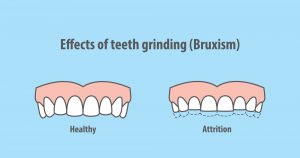Botox for Teeth Grinding (Bruxism) / TMJ
Break The Cycle Of Teeth Grinding, Tension & Pain
 V i s i t
V i s i t
Local
2-3 Weeks | 3-4 Months
Multiple sessions required
9 – 12 months
10-15 Minutes
Allergic Reactions, Bruises,
Infection & Temporary smile
asymmetry
No Downtime
Immediate
Botox for teeth grinding is emerging as a potentially effective solution for many patients. Jaw clenching, or bruxism, is a common dental condition characterized by teeth grinding, gnashing, or clenching. It can be related to TMJ (Temporomandibular Joint Disorders). It often occurs during sleep or times of stress and can lead to dental issues, facial pain, and sleep disruptions. Temporomandibular joint Botox is safe and effective.
Also, dentists recommend a mouthguard for teeth protection as well.

Bruxism and TMJ Disorder can result in:
Jaw grinding can enlarge the masseter muscle, which is responsible for chewing. Strengthening exercises for the jaw muscle are like weightlifting.
CosmeDocs offers a Botox (botulinum toxin) treatment for grinding teeth. This treatment involves injecting eight injections of botulinum toxin into the masseter muscle. This temporarily relaxes the muscles, reducing the frequency and intensity of grinding teeth and jaw clenching.
The benefits of this treatment include pain relief from bruxism, reduced dental damage, improved facial profile, decreased headaches, and relief of jaw tension. The effects last for a few months before additional treatment is needed.
Botox has now gained attention as an effective and non-invasive option for addressing teeth grinding and clenching, contrary to a mouth guard or medications. The primary cause of these conditions is a powerful masseter muscle in the jaw. This enlarged muscle can exert more than 3 times the normal force.
The masseter muscle is a feathered patterned muscle which, pound for pound, is the strongest muscle in the body. Hence, Botox for teeth grinding offers a promising solution that targets the root cause. It temporarily relaxes overactive jaw muscles responsible for grinding, alleviating discomfort and preventing potential damage.
Client Reviews
Jaw pain, often caused by temporomandibular joint (TMJ) disorder, can significantly affect daily activities. The TMJ acts as a hinge, connecting the jawbone to the skull’s temporal bones. TMJ disorder can lead to pain and discomfort in this joint.
Several common factors contribute to TMJ disorder, including:
Bruxism: Habitual grinding or jaw clenching can strain the TMJ, leading to pain and inflammation.
Jaw Misalignment: If you bite or have a deformed jaw, it can put excessive stress on the TMJ, causing discomfort and limited movement.
Stress and Anxiety: Emotional stress and anxiety can contribute to jaw tension and worsen symptoms of TMJ disorder.
Botox (botulinum toxin) is also used therapeutically to relieve symptoms of TMJ, such as pain, reduced muscle activity, and improved jaw movement, by relaxing the masseter muscle.
TMJ specialist London offers a non-invasive and quick jaw-clenching treatment with minimal downtime. Jaw Botox injections are used to provide temporary relief from TMJ symptoms, addressing masseter muscle tension and spasms.
The effects of Botox for teeth grinding last for several months, unlike uncomfortable mouth guards. They help restore normal jaw movement and functionality, improving the quality of life for individuals with TMJ.
High Risk Group for Teeth Grinding
Some groups of people are more susceptible to bruxism than others. Those at the highest risk include:
Bruxism affects both males and women at about the same rate. You may be at a greater risk of experiencing teeth grinding if you have a family history of bruxism. Other factors to remember are:
Botulinum toxin for bruxism/TMJ takes around 15-20 minutes. It is a relatively fast and efficient treatment with few side effects. The full impact of TMJ/Bruxism treatment takes 2-3 days to appear and lasts for 4-6 months.
Botox for teeth grinding is relatively safe when injected by an experienced practitioner. However, there are a few potential short-term negative effects, such as:
The effects of Jaw Botox treatment for teeth grinding typically become noticeable within a few days to a week after the procedure.
The Bruxism/TMJ treatment with Botox (botulinum toxin) takes only about 15-20 minutes. It is quite quick and effective treatment with minimal side effects. The full results of the treatment take 2-3 days to show up and they last for 4-6 months.
Botox for teeth grinding can significantly improve your condition but may not completely cure the problem. Regular Temporomandibular Joint Botox maintain symptom relief at longer intervals.
CosmeDocs is a renowned name in the industry of cosmetics. Our clinic located in Harley Street (London) is well equipped and modern practices. CosmeDocs are also well-known trainers to physicians from around the globe.
Enhance Your Experience!
We use cookies to give you the most relevant experience.
Read More about Cookie Policy
Special offers & updates on trending topics in aesthetics, fitness, beauty and lifestyle.

Lip enhancement can be approached in two distinct ways: one that is gentle and non-traumatic, leading to natural-looking results, and another that is aggressive, potentially resulting in permanent negative effects. We always adhere to the KISS principle - keep it simple and safe.
#HarleyStreetBeauty #HarleyStreetLips #LondonPoplarAesthetics #SafeCosmeticsHarleyStreet #PoplarAndHarleyBeauty #NaturalLipsHarleyStreet #EastLondonBeauty #HarleyStreetClinics #PoplarBeautyTrends #HarleyStreetSafeFillers

At times, a procedure is so quick and effective, it’s over almost before it starts. This leaves one feeling conflicted about charging patients the market rate for such swift service. But it’s a testament to the value of experience, not just the time spent, that enables such speedy success. #tweakments #dermalfiller #beautysecrets

Unveil radiant skin with our top 3 treatments for acne scars at Cosmedocs.
For Bookings Contact:
📱 +44 7735 606447
☎️ +08008600178
📧 info@cosmedocs.com
#cosmedocs#acnescars#treatment#SkincareSecrets #AcneScarSolutions#skinpeel#microneedling

Could this be a major step forward in ensuring the integrity and accuracy of transformational journeys?
Exploring the Frontiers of AI: ChatGPT’s advanced processing capabilities are a game changer, especially in distinguishing authentic before and after results.
#AIRevolution #AuthenticTransformations #ChatGPT#aestheticmedicine #calfreduction #botox

Last year, we shared an update about a client who had received fillers from us. Previously, she was having regular Botox only. We’re now excited to show you the results after almost 1 year; she’s had Botox in the meantime. The combination of both treatments has yielded fantastic results #wrinklefree #dermalfillers

#Repost @harleystreetinstitute with @use.repost
・・・
“Unlock Your Aesthetic Potential with Harley Street Institute’s Fellowship! 🌟 Elevate your skills in aesthetic medicine through our intensive hands-on training in Botox and Dermal Fillers. Get ready to sculpt beauty, one injection at a time! 💉✨ Join us for a transformative learning journey that takes you beyond the classroom and into real-world expertise. Are you ready to master the art of enhancing natural beauty? 💫 #HarleyStreetFellowship #AestheticMedicineMastery #SculptingBeauty”
#cosmedocs

“Age-defying Magic Unleashed! ✨🌟 Uncover the ultimate skincare game-changers with Cosmedocs. Our potent l-ascorbic acid serum, retinol, skin peel, and microneedling treatments are here to revolutionize your skin at any age. Prepare to bid farewell to wrinkles and hello to a radiant, ‘I woke up like this’ glow! 💫✨ #CosmedocsLondon #YouthfulSkinWizardry #LondonSkincareMasters #GlowGoalsUnlocked #SkincareWizardry #AgeIsJustANumber”

Embracing the Power of Transformation ✨ Witnessing the incredible journey of our amazing client who discovered the magic of chin and lip fillers! 💫 With a subtle touch, we enhanced her lower face, unveiling her true beauty and empowering her inner confidence. 🌟 Embrace your unique features and let your radiance shine! 💖 #transformationtuesdays
#cosmedocs ##enhancingnaturalbeauty

Unlock the Power of Collagen with Micro-Needling, PRP, Profilo, and Retinoids - Backed by Science and Proven Results! 💪🧬 #CollagenBoost #SkinCare #HealthySkin #BeautyRoutine #cosmedocs #hsifellowprogram










